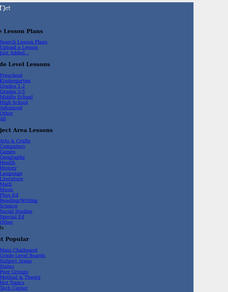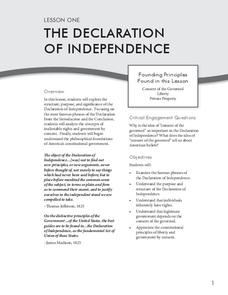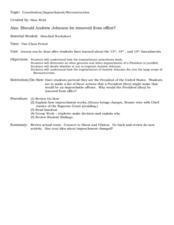Curated OER
Fairy Tails Can Show Due:It can happen for you, If you play your part.,
Learners view a Reader's Theater focusing on the story of Goldilocks and the Three Bears. The story is used as a springboard into a videotaped mock trial of Gold E. Locks developed by the American Board of Trial Advocates (ABOTA). They...
Curated OER
Are We Free Yet?
Students read excerpts from several Freedom Documents, evaluate amount of freedom guaranteed by each document, and rank documents on scale to determine which grant greatest and least amount of personal freedom.
Curated OER
The Supremes
High schoolers discuss steps cases go through to reach Supreme Court, examine Bill of Rights, and rank rights in order of importance to them. Students then research Supreme Court case dealing with one of first ten amendments, and write...
Curated OER
First Amendment Guarantee of Free Speech (Senior, Social Studies)
High schoolers receive a list of banned books from which they choose one to read. They read their chosen book and write a paper that includes a discussion of the First Amendment and its guarantees and the reason(s) why they believe their...
Curated OER
Arrests and Investigatory Stops
Students define arrest and detainment, examine hypothetical situations to determine if warrantless arrest/detainment is reasonable based on information available to police, discuss differences between hunch, suspicion, reasonable...
Curated OER
You and the Law -- Beating the Odds
Middle schoolers examine the rate of institutional racism in the United States. Individually, they write in their journals about how they can make better choices and increase their self-esteem. Using historical documents, they identify...
Judicial Learning Center
The U.S. Supreme Court
How do Supreme Court justices determine which cases to consider? What happens when the Supreme Court decides not to take a case? The lesson explores important questions and others in the field of criminology. It focuses on the...
National Endowment for the Humanities
George Washington: The Precedent President
Everyone knows that George Washington was the first president, but do your scholars know why that was so important? The lesson plan, the third in a sequence of three, allows learners to understand how George Washington set a precedent...
Curated OER
Jefferson vs. Franklin: Revolutionary Philosophers
Middle schoolers examine the contributions of Benjamin Franklin and Thomas Jefferson to American Independence. In small groups, they conduct Internet research, read and discuss primary source documents, and complete a chart.
Curated OER
Powers of Congress: The Scope of Congressional Powers
Use this as a quiz or to guide reading. There are five true/false and five multiple choice questions for the class to answer. Topics covered relate to the type of power Congress has and the constructionists movement.
Curated OER
George Washington: The Precedent President
Learners investigate precedents set during George Washington's term in office. They conduct Internet research, develop a list of the responsibilities of the President, match Washington's accomplishments with the list, and play a game.
Theodore Roosevelt Association
Interpreting the Past; Assessing Its Impact on the Present
Even though the presidency of Theodore Roosevelt ended over 100 years ago, we can still learn something from his stances and policies that is applicable today. Class members first look over a list of prevalent political issues from the...
Bill of Rights Institute
The Declaration of Independence
Take classes on an in-depth tour of the Declaration of Independence. An informative resource effectively scaffolds learning by providing warm-up and wrap-up activities. It also includes a variety of handouts for individuals to complete,...
Curated OER
Constitution/Impeachment/Reconstruction
Eleventh graders analyze a chart comparing U.S. census data from 1850, 1880, 1900, and 1920. They read a handout summarizing immigration legislation from 1882-1996 and create a graph charting how open / closed U.S. immigration is over time.
Constitutional Rights Foundation
Unauthorized Immigration and the US Economy
As part of a study of immigration and the U.S. economy, class members assume the role of newspaper editors to determine which submitted letters to print on their paper's editorial page to present a balanced view of the debate.
Constitutional Rights Foundation
History of Immigration From the 1850s to the Present
The Statue of Liberty may embrace the huddled masses of the world, but has American society always joined in? After young historians read a passage about the history of American immigration in the 19th and 20th centuries, focusing on...
Curated OER
Cartoons for the Classroom: The Bush and Clinton Years
Examine how the Bush and Clinton years are an example of political dynasties. This cartoon provides a way to explore the concept and activate critical thinking skills in order to better grasp U.S. Politics. A fun and educational way to...
New York State Education Department
US History and Government Examination: January 2018
It's time to test those skills! Assess pupils' knowledge of US history and government with short answer questions, multiple-choice items, and essays. The resource serves as a standardized test that functions well for a final exam....
Curated OER
The Federalist Defense of Diversity: Extending the Sphere
How did early Americans ensure expansion while also securing the rights of citizens? Alexander Hamilton and James Madison, two of our early leaders, considered the problem of faction to be the "mortal disease" that created unstable...
Anti-Defamation League
Harriet Tubman on the $20 Bill: The Power of Symbols
How important are symbols and symbolic gestures in society? Middle schoolers have an opportunity to analyze the importance of symbols on American currency with a lesson plan that investigates the controversies surrounding redesigning the...
Constitutional Rights Foundation
Driver’s Licenses And Unauthorized Immigrants
Should driver's licenses be granted to unauthorized immigrants? That is the question class members grapple with in a instructional activity that asks them to first read a fact sheet that details the arguments for and against...
Constitutional Rights Foundation
Guest-Worker Program
The U.S. Guest-Worker Program and the H-2A visa are the focus of a social studies activity. First, class members assume the role of advisors who must present the president with four proposals that would amend the visas given to...
Curated OER
Abolitionists and Their Impact on Sectionalism
Eleventh graders examine the impact of Abolitionist leaders on sectionalism. In small groups, they conduct research on a famous abolitionist, and develop and write a newspaper cover page based on their assigned abolitionist.
Curated OER
The Perfect President
Students advertise for the perfect president. In this presidential duties lesson plan, students determine the attributes that the ideal president should have and then write job descriptions for the role.
Other popular searches
- United States Constitution
- United Statesusus Constitution
- The United States Constitution
- Unites States Constitution

























